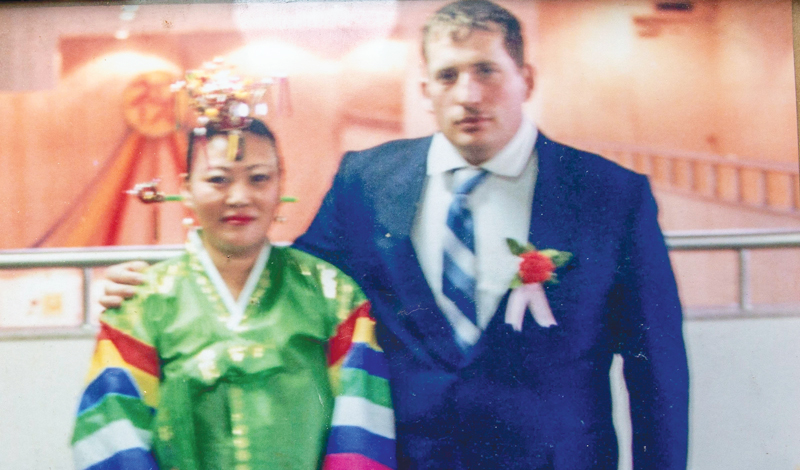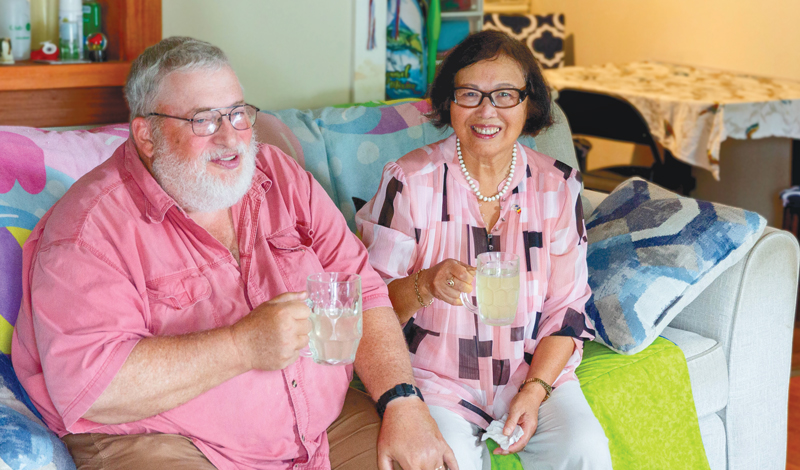by Kum Bonnewell
Clarksville, Tennessee
“I found her,” my sister said between breaths over the phone. “That woman who never paid—she’s here, at Camp Casey! Come quick!”
Catching the next train to Dongducheon, I worked my way back through the events that led to our mother’s death—the heart failure that followed the severe depression brought on by the betrayal of her longtime friend. I thought of this friend now, whose little daughter was always slung around her neck. For years, she’d run a tailor’s shop down the street from us in Seoul, then borrowed my mother’s life savings and vanished from the face of the earth. Five years had passed. I was 26 now, the year 1978.
Maybe she’ll give it back, I thought.
This woman wept when she saw my sister and me. She’d taken her daughter and run, she said, not only from debtors but from her husband, a man whose drinking was the cause of their debt. I decided to keep certain facts to myself: how much her betrayal had destroyed my trust in people, for instance; how for years I’d walked with my eyes on the ground, from work to home to work again. I didn’t mention my mother’s death and my own attempts on my life. We wept with her. “I’ll pay it back,” she promised, “a little each month.” And for the next six months, she did.
At the end of the seventh month, my knock was answered by her landlord. “She’s gone,” I was told—married and off to America.
That month, I paid my electric and water bills and had nothing left for food. I was in my apartment fuming, my mind racing.
If it weren’t for you, maybe my mom would be alive; maybe we’d still have the shop; maybe I could have gone to school—all this I wanted to put to that woman, to her face. Round and round my mind went, till my thoughts were interrupted by a knock. More bad news, I thought, but I opened it anyway. I recognized the woman as the owner of a little shop nearby. And I recognized, too, the magazine tucked beneath her arm.
Before my mother had passed away, before we lost our shop to debtors, we’d had a customer, a regular, who’d offered me a copy of Beop Ryeon, the Korea SGI monthly study magazine. I remembered what I’d read inside, a different kind of story than the one I’d heard from other faiths, a story of becoming happy now. I’d tried chanting Nam-myoho-renge-kyo and felt good.
I had nothing save a little rice, a roof overhead and unlimited time. Also unlimited water. I took the magazine. I’d chant a lot of daimoku, I decided, and, to curb my appetite, drink a lot of water.
As I chanted, I felt changes—my body growing stronger, my health improving and my mind less heavy. In fact, my resentments fell away, and my mind leaped from hope to hope.
Within a few days, I got my own copy of Beop Ryeon and went around speaking with neighbors about Nam-myoho-renge-kyo. Poor as I was, I offended a few, who threw salt shouting, “Yeah, don’t even come back!” Who was I to tell them something, they wanted to know, when I had even less than they did.
So I have no money now, I thought. Someday my life will be fulfilled! I’m a Buddha, I’ll be happy!
Outwardly, the biggest change was that I began looking people in the eye.
Within 10 days, I’d found a job that paid my water, electricity and rent. I had a little left for food and a contribution to the SGI—I was told I could make one, didn’t matter how much, only that I make it from the heart. I remember my first 10 won contribution—about $2 back then—which I made to the SGI with deep appreciation for the changes I was experiencing.
Noticeably, I was beginning to trust people and, even, to like them. Actually, by the mid ’80s, I’d begun to think that I might want to spend my life with one.

In 1988, a friend set me up on a coffee date with a soldier. His name was Matthew, he was studying Korean.
“I speak Korean!” I said, and searched my bag for my copy of Beop Ryeon. “Here,” I said, “here, we can study this together!”
We married and moved to the States in 1991, hopping across four states in the span of a year before my husband was deployed to Kuwait, and I moved into his home in Tennessee.
Somehow, I did not fear for him. Today would be better than yesterday, tomorrow, better than today. With faith in this, I took action, challenging to offer contributions that reflected my vow, trusting in a future that would grow more beautiful with time.
Three months in, he was called into the company commander’s office and discharged; he’d weighed in, they said, a pound over limit. He came home to Tennessee and found work. At first, his discharge seemed a great misfortune—he was just a few years out from 20 years of service, after which he’d qualify for monthly retired pay for life. But looking back, we both feel deeply protected. My husband doesn’t talk about that war, but he will tell you that not all his friends came back, and that of those who did, not all came back whole. What’s more, after years of mediation, his discharge was justified by a lawyer, and we received large sums—decades of backpay—that we used to purchase properties—six, now, in all—for rent.
We’re very happy, he and I, with many friends and a big happy family. We love to travel—our goal is to see 100 countries within our lifetimes. But most of all, we love our neighbors, who come over for my Korean pancakes and his zucchini bread.
I still think about that old friend of the family, the one who made off with our money, and of her little daughter slung around her neck. Actually, I discovered, sometime back, that her daughter is chanting today, practicing with the SGI.
I’d like to meet again with my mother’s old friend, to tell her thank you. Were it not for you, I’d say, I’d have never come to Camp Casey, never met my husband, never begun chanting Nam-myoho-renge-kyo. I want to tell her that she kept her promise, the one she made at Camp Casey, to pay me back. She has, in full—everything and more.
You are reading {{ meterCount }} of {{ meterMax }} free premium articles

